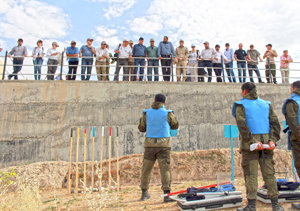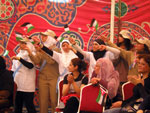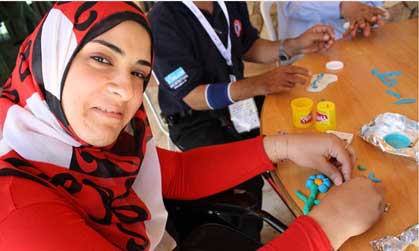HMA and CWD Projects
For over 25 years, CISR has provided innovative and reliable research, training, information exchanges and direct services to the global humanitarian mine action community. Utilizing the expertise of our in-house staff, university resources, and international partners, CISR is uniquely placed to develop and implement programming across multiple sectors. Our work contributes to building peaceful and prosperous futures for communities impacted by conflict.
Conventional Weapons Destruction and Mine Action Projects
Management Training for HMA and CWD

CISR, working in close collaboration with faculty from JMU’s College of Business, has trained over 300 senior managers (representing more than 63 countries) who work directly in mine and explosive remnants of war-affected countries. By integrating the latest business management concepts and the experience of experts in the field, CISR's management training builds the capacity of national mine action and conventional weapons destruction programs that save lives and support economic development and recovery.
“The most valuable aspect of the course for me is the exposure to the wider mine action sector. I had [the] opportunity to interact with experience[d] mine action individuals from around the world to learn more about different contexts, how programs are run, what challenges are faced and how they overcome these challenges …” – 2016 SMC Global participant
Explosive Ordnance Risk Education
- Explosive Ordnance Risk Education Research, Lao PDR: A comprehensive, independent analysis of EORE programming in Lao PDR evaluating the methodology and efficacy for measuring behavior change, attitudes, and behavior of current risk education delivery and curriculum.
- EORE Train-the-trainer: In 2014, CISR also collaborated with Jordan’s National Committee for Demining and Rehabilitation to develop and conduct explosive ordnance risk education workshops for 75 Syrian refugee women and men teaching them how to conduct ERW risk education programs within their own communities.
 "We Love Life" is explosive ordnance risk education in the form of a theatrical play and creative arts. The program raises awareness and prevents young people from taking risks that result in explosive remnants of war related accidents. This comprehensive mine risk education experience targeted youth audiences in Jordan was developed in consultation with the Life Line for Consultancy & Rehabilitation and a team of experienced child psychologists from James Madison University.
"We Love Life" is explosive ordnance risk education in the form of a theatrical play and creative arts. The program raises awareness and prevents young people from taking risks that result in explosive remnants of war related accidents. This comprehensive mine risk education experience targeted youth audiences in Jordan was developed in consultation with the Life Line for Consultancy & Rehabilitation and a team of experienced child psychologists from James Madison University.
- In 2009, the play reached nearly 6,000 children and local community members in northwestern Jordan. In 2010, additional performances and art activities reached an even larger sector of the Jordanian school population. In 2014, "We Love Life" creative arts workshops were held cross northern Jordan providing ERW risk education to 250 Jordanian children and 250 Syrian refugee children.
- Altogether, nearly 16,500 youth directly benefitted from the performances and arts activities in 2009–2014, sponsored by the U.S. Department of State.
Studies of the Aging of Landmines and Underwater Munitions
In 2023, CISR partnered with JMU STEM faculty and Fenix Insight Ltd. to observe and characterize the visual and structural changes that occur to munitions as a result of aging in an underwater environment.
In previous studies, CISR and CKing Associates studied the effects of aging of landmines in Cambodia, Joradan, and the Falkland Islands.
Survivor Assistance

CISR's psychosocial peer support workshops provide training to victims of conflict and trauma to become peer counselors to those who are also suffering. Working with local partner organizations, CISR’s peer support specialists customize training materials so they conform to the cultural and educational background of the trainees. Stories and examples informed by survivors are used to teach techniques in peer counseling. Special exercises are designed to teach counseling skills to trainees who do not read or write. Recent trainings have taken place in Burundi, Colombia, Rwanda, Uganda and Vietnam.
"We are all survivors, and surviving has made us stronger." Adelite Mukamana, IBUKA's Director of Psycho-social Rehabilitation (Burundi)
Learn more about trauma recovery

Pathways to Resilience (P2R), is a workshop providing an innovative regional leadership and training program for survivors of landmines and other explosive ordnance injuries in the Middle East. The workshop helped survivors make meaning of past events, learn to manage emotions in new ways, and find social support, personal strength and inspiration. Program activities promoted resilience using experience-based learning followed by reflective observation.
"I had many problems, but I came to Lebanon and participated in this meeting, and I am able to overcome a large number of challenges. I can now recover from the psychological crises I have suffered, which limited my hopes and ambitions." – P2R participant from Yemen
International Workshops
Since 1997, CISR has planned, facilitated, and hosted nearly two dozen workshops and conferences related to HMA-topics such as data integrity, survivors’ assistance, technical procedures, and regional/country-specific issues. CISR-hosted conferences/workshops have taken place in Colombia, Peru, Slovenia, Thailand, as well as in locations across the United States, from Washington, D.C. to Seattle and the James Madison University campus in Harrisonburg, Virginia. Proceedings and reports from many conferences are available on the CISR website.
Geographic Information Systems and Mapping Services
CISR is a consultant for HMA-related geographic information system (GIS) and map-development services. From 2015–2018, CISR conducted multiple innovative GIS and mapping services for the mine action community sponsored by the U.S. Department of State.
CISR hosts a free map library with over 300 maps, and offers other GIS Services.
Disability Rights

In 2014 CISR subject-matter experts worked closely with the Association for the Empowerment of Persons with Disabilities (AEPD) to provide capacity-building training workshops for 70 disabled persons’ organizations (DPOs) across three provinces in central Vietnam. The training provided DPO staff and local government officials with the skills and knowledge to conduct a strategic multimedia public relations campaign with positive messaging promoting and informing communities of the rights of persons with disabilities under Vietnam’s national disability law.
